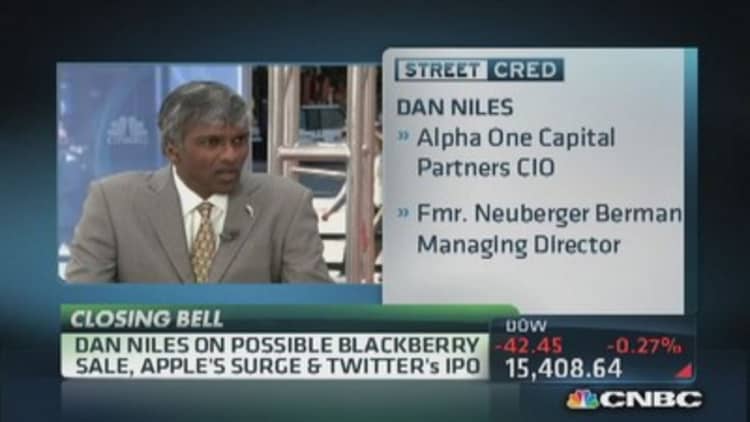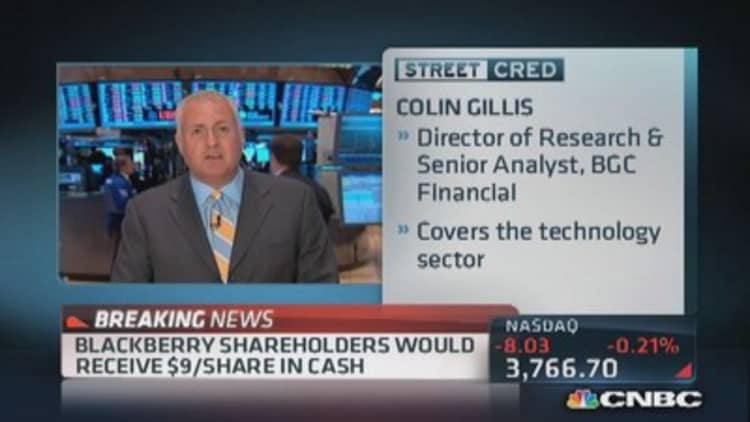It's been a whirlwind several days for BlackBerry.
Last Friday the company announced that their business was in free-fall, expecting to post a net operating loss of nearly $1 billion and to lay off approximately 4,500 workers.
Then on Monday, they announced a take-private bid from their largest shareholder, Fairfax Financial Holding, who owns about 10 percent of the company's stock.
But is this buyout bid for real, or is it merely a stalking horse bid to either obscure another party or create a sense of urgency among strategic players? For many reasons, I am inclined to believe the latter.
(Read more: BlackBerry buyout: Should investors 'take money and run'?)
To begin with, there's very little downside and a whole lot of upside for Fairfax to make this bid. The bid is hardly airtight; based on reports, Fairfax does not have financing attached to the bid and there are basically no penalties for failing to follow through.

On the other hand, it appears that there is a breakup fee if BlackBerry bows out or accepts another offer. Given the lack of downside coupled with the upside of stemming further price denigration one is inclined to ask "why wouldn't Fairfax make the bid?"
Secondly, BlackBerry would offer more value to a strategic buyer. While BlackBerry had around $2.6 billion in cash at the end of the last quarter, the company's biggest assets are its user base of 70 million and a portfolio of more than 5,000 patents valued north of $2 billion.
(Read more: BlackBerry bought private jet months before layoffs
BlackBerry hasn't been able to optimize these assets, which are likely of best use in the hands of a strategic buyer. According to reports, the consortium of buyers headed by Fairfax does not include any strategic players, which further supports the stalking horse view.
Having Fairfax come forward creates a defined time frame and benchmark pricing for a bid, publicly putting the company into play. It forces the hand of any strategic bidders that may be waiting for further price slippage to make a decision and is a common corporate finance tactic.

Additionally, it is difficult to argue that $9.00 per share is a fair value for BlackBerry.
For a take-private transaction for a company of BlackBerry's size, shareholders will want a fairness opinion – a formal document created by independent investment bankers that uses various information and a valuation methodology to determine whether or not the offer price is fair.
Having worked on many fairness opinions in my career, I highly doubt that a reputable investment bank would consider $9.00 a share fair.
Even with the issues surrounding the company, the premium offered was only a paltry 3.1 percent to Friday's $8.73 closing price, and sharply lower than Friday's opening price of $10.50. Not to mention that, with the exception of the past few days, the stock has only spent a handful of days below the $9.00 threshold this calendar year.
(Read more: When all else fails, go private: BlackBerry deal)
Unless a very comprehensive process had been run in the background with many potential buyers passing at significantly higher values, writing a fairness opinion to back up the $9.00 offer price would be a tremendous challenge.
The bottom line is that this take-private bid may be more sizzle than steak. The bid expiration is set for November 4th, so in short order we will see if this take-private bid has any real meat to it.
Carol Roth is a CNBC Contributor, a 'recovering' investment banker and bestselling author of The Entrepreneur Equation. Follow her on Twitter: @CarolJSRoth

